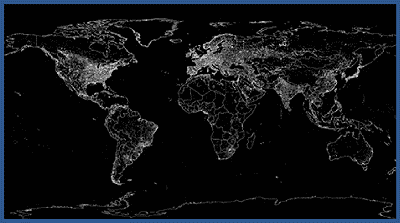|
|
 |
| |
Planet
Earth
|
| |
by
Thomas Klutznick '61, Chair, Oberlin Board of Trustees |
| |
|
 |
continued
from first page...
By
one estimate the average American in his or her lifetime
will use the energy equivalent of 4,000 barrels of petroleum--not
to mention 62,000 pounds of animal products, 55,000 pounds
of plant foods, and 770 tons of minerals. This
pattern of behavior will no doubt come back to haunt us.
Biologists have coined a word--biodiversity--to encompass
the variety and interconnectedness of all life. The fragile
balance of plants and animals that share the Earth took
millions of years to develop. Some life-forms have perished
and will not return; others, like ourselves, are relative
newcomers.
In
Earth's 4.5-billion-year history, however, there have
been five mass extinctions caused by fury from the heavens
or other natural phenomena. The last of these took place
some 65 million years ago and ended the reign of the
dinosaurs and killed about two-thirds of all animals.
Biologists are now warning that we are in the midst
of a sixth major extinction and that there is something
disturbingly unique about this one: It is the first
mass dying that is being driven by human activity.
Mankind's
list of sins is long. We have cleared nearly half of
Earth's original forest cover for pastures and croplands
and human settlements. We have introduced exotic species
into environments that have no defenses against them.
Witness the water hyacinth that chokes Florida's inland
waterways. We over-harvest and pollute ecosystems and
thus destroy or threaten the life that depends on them.
If we continue to wreak havoc with the planet's biodiversity,
the consequences will be profound. The Earth is a very
big place, but its resources--and resilience--are not
limitless.
Some
believe that conservation is the ultimate answer, and
that the key to conservation is to identify, inventory,
and protect the world's remaining repositories of plant
and animal diversity. But as one conservationist has observed:
"In the end, we will conserve
only what we love, we will love only what we understand
and we will understand only what we are taught."
Let
me make my point by posing a rhetorical question: Doesn't
it follow that we stand to benefit if we nurture that
which nurtures us?
Instead
of cursing the darkness, I'm going to try to light a
candle. Norman Myers, through the methodology of Gaia,
promotes understanding, communication, enlightened self-interest,
and action. It is clear that world leadership must come
together to deal with the following issues:
• Availability
of potable water
• Despoiling
of our oceans
• Management of farmlands
• Restoration
of habitat, such as rain forests
• Use
of alternative fuels, and
• Protection
of the ozone layer and thus civilization
Every
day the Earth and its inhabitants become more and more
accessible through the incredible advances in electronic
communication. Opportunities for individual action are
greater today than ever before in opening paths between
the advantaged and disadvantaged nations and peoples
of the world.
So
as we enter not only a new century but also a new millennium--a
horological phenomenon that won't be repeated for another
30-plus generations, our thoughts turn to the past as
well as to the future.
As
for the past, we stand in awe--and in some instances
in horror--of what mankind has wrought in the last thousand
years. Because remember that amid the dots of light
in that satellite image are Michelangelo's frescoes
in the Sistine Chapel, the launch pad at Cape Canaveral,
the city where Gutenberg first printed with movable
type, the spinning wheel of Mohandas Gandhi, the remnants
of the Holy Roman Empire--and also, it must be noted,
the monstrous legacies of Adolf Hitler, Joseph Stalin,
and Mao Tse-tung.
As
for the future, we can only wonder what kind of place
the world will be a thousand years hence. Will California
have split off and drifted over and attached itself
to Japan? Will wars in the name of religion have reshaped
those political boundaries we call nations? Will our
species have abandoned this planet and colonized another?
Your guess is as good as mine, but of one thing I am
certain: In our wildest imaginings we cannot come close
to the answer, any more than the brightest and best
among the 280 million people who inhabited the Earth
in the year 1000 could have imagined us and our world.
Yes,
we have accomplished much. We have conquered time and
space. We have largely tamed the elements. And we have
turned a hostile sphere into a habitable, life-sustaining
refuge amid the vast emptiness of space. But much remains
to be done.
Mankind
is nothing if not ingenious and tenacious and, ultimately,
humane. Thus I am hopeful that eventually we will right
the wronged, feed the hungry, clothe the naked, heal
the sick, and free the oppressed. It may take a few
centuries, but if we and those who come after us can
accomplish this, then a thousand years from now when
someone, somewhere, is listing the achievements of the
third millennium, he or she will be able to raise a
glass and say "well done." •
| What
you are looking at is the first global inventory
of human settlements from nighttime data gathered
by satellites with the unique ability to observe
faint sources of visible, near infrared, emissions
present at the Earth's surface, including cities,
towns, villages, natural-gas flares, and fishing
fleets. This satellite image is a composite of cloud-free
observations made over a six-month period from October
1994 through March 1995. In addition to being a
thrilling sight, it provides an excellent backdrop
for some thoughts I want to share with you regarding
the state of our planet- a fitting topic, I think,
for this millenial year. |
 |
go
to page | 1 | 2 | of
Planet Earth
|
|
|

